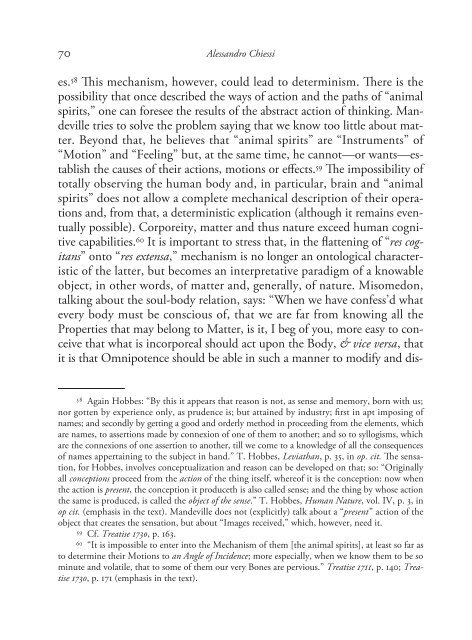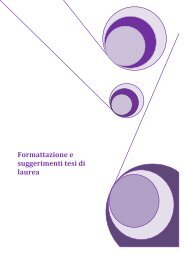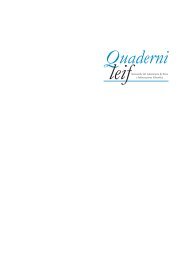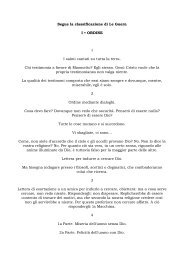qui - maria vita romeo
qui - maria vita romeo
qui - maria vita romeo
You also want an ePaper? Increase the reach of your titles
YUMPU automatically turns print PDFs into web optimized ePapers that Google loves.
70 Alessandro Chiessi<br />
es. 58 is mechanism, however, could lead to determinism. ere is the<br />
possibility that once described the ways of action and the paths of “animal<br />
spirits,” one can foresee the results of the abstract action of thinking. Mandeville<br />
tries to solve the problem saying that we know too little about matter.<br />
Beyond that, he believes that “animal spirits” are “Instruments” of<br />
“Motion” and “Feeling” but, at the same time, he cannot—or wants—establish<br />
the causes of their actions, motions or effects. 59 e impossibility of<br />
totally observing the human body and, in particular, brain and “animal<br />
spirits” does not allow a complete mechanical description of their operations<br />
and, from that, a deterministic explication (although it remains eventually<br />
possible). Corporeity, matter and thus nature exceed human cognitive<br />
capabilities. 60 It is important to stress that, in the flattening of “res cogitans”<br />
onto “res extensa,” mechanism is no longer an ontological characteristic<br />
of the latter, but becomes an interpretative paradigm of a knowable<br />
object, in other words, of matter and, generally, of nature. Misomedon,<br />
talking about the soul-body relation, says: “When we have confess’d what<br />
every body must be conscious of, that we are far from knowing all the<br />
Properties that may belong to Matter, is it, I beg of you, more easy to conceive<br />
that what is incorporeal should act upon the Body, & vice versa, that<br />
it is that Omnipotence should be able in such a manner to modify and dis-<br />
58 Again Hobbes: “By this it appears that reason is not, as sense and memory, born with us;<br />
nor gotten by experience only, as prudence is; but attained by industry; first in apt imposing of<br />
names; and secondly by getting a good and orderly method in proceeding from the elements, which<br />
are names, to assertions made by connexion of one of them to another; and so to syllogisms, which<br />
are the connexions of one assertion to another, till we come to a knowledge of all the consequences<br />
of names appertaining to the subject in hand.” T. Hobbes, Leviathan, p. 35, in op. cit. e sensation,<br />
for Hobbes, involves conceptualization and reason can be developed on that; so: “Originally<br />
all conceptions proceed from the action of the thing itself, whereof it is the conception: now when<br />
the action is present, the conception it produceth is also called sense; and the thing by whose action<br />
the same is produced, is called the object of the sense.” T. Hobbes, Human Nature, vol. IV, p. 3, in<br />
op cit. (emphasis in the text). Mandeville does not (explicitly) talk about a “present” action of the<br />
object that creates the sensation, but about “Images received,” which, however, need it.<br />
59 Cf. Treatise 1730, p. 163.<br />
60 “It is impossible to enter into the Mechanism of them [the animal spirits], at least so far as<br />
to determine their Motions to an Angle of Incidence; more especially, when we know them to be so<br />
minute and volatile, that to some of them our very Bones are pervious.” Treatise 1711, p. 140; Treatise<br />
1730, p. 171 (emphasis in the text).








